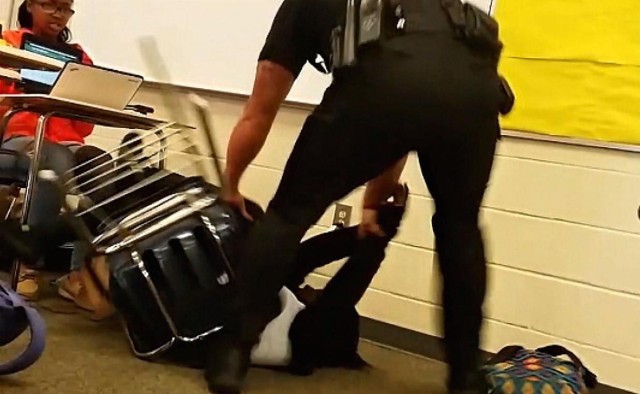
Officer Ben Fields had not a moment’s hesitation in putting a black girl in a chokehold to yank her from her desk chair, slam her to ground and throw her across her classroom. The video of this assault has gone viral and has rightly prompted outrage from white people.
Here’s the thing: The suspension, expulsions, beating and arresting of black students in the U.S. is closer to the rule than the exception when childish behaviors occur at school. The national statistics on how often school discipline involves authorities physically attacking students isn’t available. But we do have data on the disproportionately high rates of out-of-school suspensions, expulsions and referrals to the criminal justice system that black children experience in our schools on a daily basis.
Here are some recent stories illustrating the data:
Honor student Kiera Wilmot, a black high school sophomore, was arrested for conducting a science experiment that had been going viral on the internet by putting household cleaner and a piece of aluminum foil in a bottle and making smoke. She was charged with two felonies.
A 14-year-old black student from Texas was choked by a school police officer “for his own safety,” during a lunch-room tussle with another student.
A 12-year-old black boy was arrested for engaging in a staring contest with a white student, who while giggling, told the teacher that she felt “intimidated” though she had started the game.
Dontradrian Bruce, a black high school student who earned all A’s and B’s, held up three fingers–the number of his football jersey- in a photo taken by his science teacher as he completed a successful science project. Dontradrian was suspended for 21 days, accused of making a gang sign.
Kyle Thompson’s school principal said that Kyle was such a great kid, he wished his school was full of Kyle Thompson’s. Yet when this 14-year-old black student declined to show his teacher a note he had written, the child was led from school in handcuffs, barred from all public schools in the state for a year and is spending a year under house arrest.
The criminalization of black children starts almost the moment that child leaves her mother’s door. According to a recent report from the National Education Association, black children represent only 18% of pre-schoolers, but they make up nearly half of all pre-school suspensions. Anecdotal evidence is sometimes even more horrifying than the data itself:
Joah was 3 years old and his mother received a call from the school that he hit a staff member on the arm, was deemed “a danger to the staff,” and suspended. He was suspended 5 times that year.
A little 5-year-old black child in Mississippi was required to wear black shoes as part of the school’s dress code. The family didn’t have black shoes for him and his mother colored in some white and red sneakers with black magic marker. He was nabbed by the cops at school and sent home in the back of a police vehicle.
Due to a spike in crime by juveniles in the 1990s, social scientist John Delulio propagated a myth of the rise of “superpredators.” These superpredators were to be “radically impulsive, brutally remorseless elementary school youngsters who pack guns instead of lunches” and “have absolutely no respect for human life.” This false panic paved the way for Zero Tolerance policies that over-criminalized childish behaviors in schools. Consequently, we’ve seen expulsions and suspensions almost double since then. The Vera Institute reports that about 2 million secondary school students are now suspended annually. Compare that to the fact that just 3 million students graduated high school that same year.
Black and Latino students are suspended and expelled at much higher rates than white students. Black students in middle school are suspended at a rate almost four times more often than white youth, and three times more likely than white youth for the same infractions overall. Particularly alarming is that over 70% of all students receiving school-related arrests and referrals to law enforcement are black or Latino.
The consequences of both this excessive criminalizing of children and the racial bias in harsh punishments are extreme. The Kirwan Institute cites studies showing that a single suspension in the first year of high school doubles the dropout chance for that child. Children who experience expulsions are three times more likely to end up in the juvenile justice system. Once caught within the juvenile system, the psychological and economic consequences can have a lasting and burdensome impact on children while simultaneously decreasing their educational and financial opportunities, and increasing the chances of re-incarceration. People incarcerated as youth are nearly 70% more likely to be in jail again by age 25 than youth who were not referred to juvenile detention.
The current discipline policies in our schools undoubtedly criminalize our children and criminalize them with a bias, especially against black youth. When officers like Ben Fields react to a child who won’t relinquish her cell phone with excessive violence and arrest, he is potentially condemning her before she has even had the chance to grow up. Right now, our school policies assume black kids are criminals and we should beat ‘em up, kick ‘em out and lock ‘em up.
Are you outraged yet?